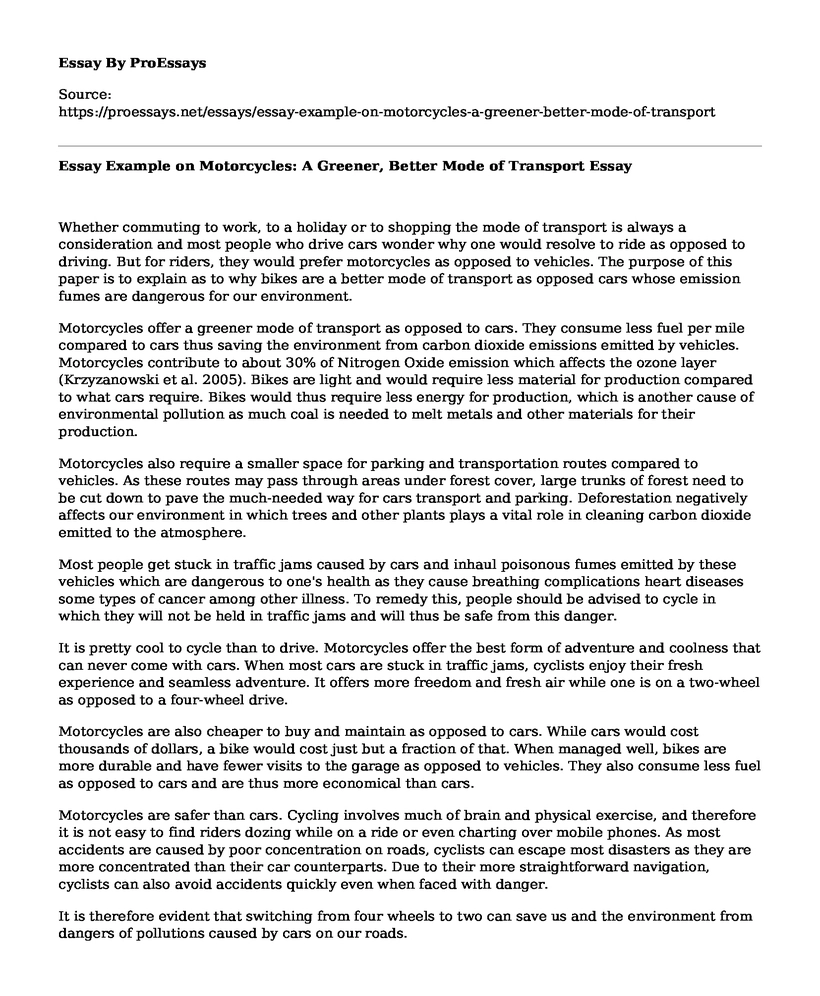Whether commuting to work, to a holiday or to shopping the mode of transport is always a consideration and most people who drive cars wonder why one would resolve to ride as opposed to driving. But for riders, they would prefer motorcycles as opposed to vehicles. The purpose of this paper is to explain as to why bikes are a better mode of transport as opposed cars whose emission fumes are dangerous for our environment.
Motorcycles offer a greener mode of transport as opposed to cars. They consume less fuel per mile compared to cars thus saving the environment from carbon dioxide emissions emitted by vehicles. Motorcycles contribute to about 30% of Nitrogen Oxide emission which affects the ozone layer (Krzyzanowski et al. 2005). Bikes are light and would require less material for production compared to what cars require. Bikes would thus require less energy for production, which is another cause of environmental pollution as much coal is needed to melt metals and other materials for their production.
Motorcycles also require a smaller space for parking and transportation routes compared to vehicles. As these routes may pass through areas under forest cover, large trunks of forest need to be cut down to pave the much-needed way for cars transport and parking. Deforestation negatively affects our environment in which trees and other plants plays a vital role in cleaning carbon dioxide emitted to the atmosphere.
Most people get stuck in traffic jams caused by cars and inhaul poisonous fumes emitted by these vehicles which are dangerous to one's health as they cause breathing complications heart diseases some types of cancer among other illness. To remedy this, people should be advised to cycle in which they will not be held in traffic jams and will thus be safe from this danger.
It is pretty cool to cycle than to drive. Motorcycles offer the best form of adventure and coolness that can never come with cars. When most cars are stuck in traffic jams, cyclists enjoy their fresh experience and seamless adventure. It offers more freedom and fresh air while one is on a two-wheel as opposed to a four-wheel drive.
Motorcycles are also cheaper to buy and maintain as opposed to cars. While cars would cost thousands of dollars, a bike would cost just but a fraction of that. When managed well, bikes are more durable and have fewer visits to the garage as opposed to vehicles. They also consume less fuel as opposed to cars and are thus more economical than cars.
Motorcycles are safer than cars. Cycling involves much of brain and physical exercise, and therefore it is not easy to find riders dozing while on a ride or even charting over mobile phones. As most accidents are caused by poor concentration on roads, cyclists can escape most disasters as they are more concentrated than their car counterparts. Due to their more straightforward navigation, cyclists can also avoid accidents quickly even when faced with danger.
It is therefore evident that switching from four wheels to two can save us and the environment from dangers of pollutions caused by cars on our roads.
Work Cited
Krzyzanowski, Michal, Birgit Kuna-Dibbert, and Jurgen Schneider, eds. Health Effects of Transport-Related Air Pollution. WHO Regional Office Europe, 2005.
Cite this page
Essay Example on Motorcycles: A Greener, Better Mode of Transport. (2023, Jan 11). Retrieved from https://proessays.net/essays/essay-example-on-motorcycles-a-greener-better-mode-of-transport
If you are the original author of this essay and no longer wish to have it published on the ProEssays website, please click below to request its removal:
- Artificial Intelligence and Theory of Mind Essay Example
- Cyber Defense and Artificial Intelligence Paper Example
- Using iPhone Xs - Essay Sample
- Front-Line Leaders: Building High-Performance Organizations From the Ground Up - Essay Sample
- Revolutionizing Transportation: Cars Since the Advent of Karl Benz - Research Proposal
- Renewable Power Source: From Wood to Hydropower & Biomass - Essay Sample
- Essay on AI for Marketers: Unlocking New Market Fundamentals & Predicting Fluctuations







